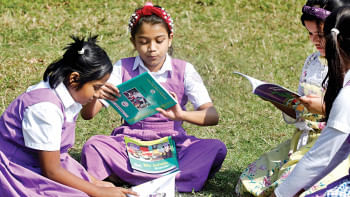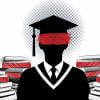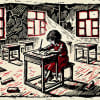Are schools up to the task?

Far too frequently, media reports bring to the fore egregious, shameful and hard-to-believe incidents taking place in the education arena. A medical college teacher brandishes a gun and knives at students and shoots a student in the leg in the classroom, apparently under drug influence. Teachers and fellow students are accused of sexual harassment of female students. Heads of institutions engage in—or look the other way of—nepotism, bribery, extortion, and violence on campus, ignoring rules and procedures. Institutions cede control and discipline in student dormitories to student groups linked to the ruling party. Perpetrators get away because these behaviours are aided and abetted by the political masters operating on their own calculation of gains and benefits. They enjoy impunity as students and teachers associated with groups or organisations under the aegis of the past and current ruling parties are judged by and rewarded for their political and factional loyalty.
In the context of a general state of moral degeneration of society at large, what can schools and the education system do to help the next generation grow up with a moral compass?
An Education Watch report in 2017 titled "Ethics and Values in School: Capturing the Spirit of Education," in which this author was the principal researcher, probed this question. A recent book titled Ekush Shotoke Bangladesh: Shikkhar Rupantor by this writer devoted a chapter on ethics and values education attempting to look at the question within the broader context of transforming education in Bangladesh for the 21st century. Key points regarding defining the challenges and clues to pragmatic policy options discussed in this article draw from these sources.
In the broad social context that generates pessimism, a positive message is the potential role of teachers—individually and collectively. A teacher's capabilities, professional competence and ethical position can determine to a large extent what the school can do in the larger negative social context, even overcoming to a degree the limits set by society and state.
Three questions are asked in examining the concept of ethics and values and how they may be inculcated among the young: i) how ethics and values are defined and understood; ii) what schools and teachers can do about it; and iii) what obstacles arise, especially in the prevailing socio-political environment, and how these can be overcome.
A person begins to form self-awareness and self-identity, core beliefs and a way of looking at society and the world by being raised in a family. They then engage in social interaction with others. There are also near-universal normative goals that have emerged since the Universal Declaration of Human Rights in 1948 and the subsequent international conventions and treaties intended to serve as guides for behaviour and action in society. This perspective has led to defining and constructing nine domains of ethics and values, which served as the analytical framework for the above-mentioned studies. The nine domains are:
1. Personal beliefs about ethics and values as human beings
2. Interpersonal relationships
3. Responsibility as a member of community, society and a nation
4. Responsibility as a global citizen and belonging to the human community
5. Building a just and democratic society
6. Protecting environment and the planet
7. Gender justice, norms and attitudes
8. Attitudes and behaviour towards children
9. Actions to uphold ethics and values
The Education Watch study examined the reflection of these nine domains in the school curricula, textbooks and teachers' training. It found a clear dominance of domain one related to personal beliefs about ethics and values and much less presence of practical application of ethics and values represented by the other domains.
To what extent, then, are schools, the education system, and especially teachers ready to help the next generation develop their critical intelligence about ethics and values and living by these principles? The selection of themes and topics in curricula, textbooks and teachers' training indicate a preference for didactic and prescriptive approach to teaching and learning, which doesn't work very well. This is a widely discussed problem in the country's education system, not just for teaching ethics and values.
A recurring theme in the study was a perception of a general degradation of ethics and values in society, community and family, which became a major obstacle to promoting ethics and values in the new generation.
The phenomenon of cognitive dissonance—holding knowingly or innocently contradictory beliefs and attitudes—was a significant finding of the study. Leon Festinger, protagonist of the theory, suggested half a century ago that this was a means of seeking a psychological comfort zone or rationalising opportunistic or even immoral conduct by the holder of conflicting beliefs simultaneously.
Cognitive dissonance is manifested on a grand scale at state policy level on critical national issues in Bangladesh. There are simultaneous provisions for secularism and Islam as a state religion in the national constitution. There is ambivalence about the rights and dignity of ethnic and other minorities. There are contradictions about gender roles and equality with resistance to the withdrawal of reservations on clauses in the UN Convention on the Elimination of All Forms of Discrimination against Women (CEDAW), when most other Muslim countries have no such reservations.
In the broad social context that generates pessimism, a positive message is the potential role of teachers—individually and collectively. A teacher's capabilities, professional competence and ethical position can determine to a large extent what the school can do in the larger negative social context, even overcoming to a degree the limits set by society and state.
However, to enable teachers to play their role, genuine out-of-box thinking is necessary. The study found that half of the current teachers did not consider themselves as role models to their students, and two-thirds of the students did not look upon their teachers as role models. But young people do look upon adults, especially teachers, for guidance, and the young learn by imitating elders.
The new thinking about teachers entails creating a nationwide force of "new teachers." The study recommends a four-step, 10-year plan to initiate a permanent programme to prepare young people for the teaching profession—starting at the undergraduate level and inducting them into a national teaching service corps with high remuneration. The state should ensure that no teacher stands in a classroom without the professional skills and necessary emotional and moral attributes.
Social and political constraints are not set in stone. Boundaries can be pushed by the motivation, determination and moral strength of teachers if they work in tandem with other stakeholders—students, parents, and community leaders—who together form the large majority of the citizens.
Dr Manzoor Ahmed is professor emeritus at Brac University, chair of Bangladesh ECD Network (BEN), adviser to CAMPE Council, and associate editor at the International Journal of Educational Development. Views expressed in the article are the author's own.
Views expressed in the article are the author's own.
Follow The Daily Star Opinion on Facebook for the latest opinions, commentaries and analyses by experts and professionals. To contribute your article or letter to The Daily Star Opinion, see our guidelines for submission.

 For all latest news, follow The Daily Star's Google News channel.
For all latest news, follow The Daily Star's Google News channel. 











Comments